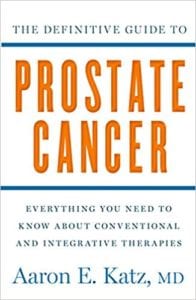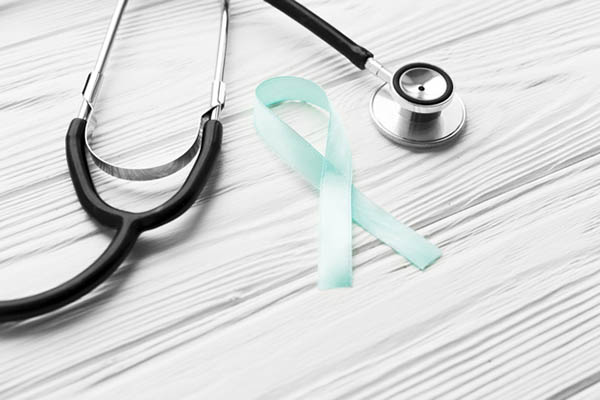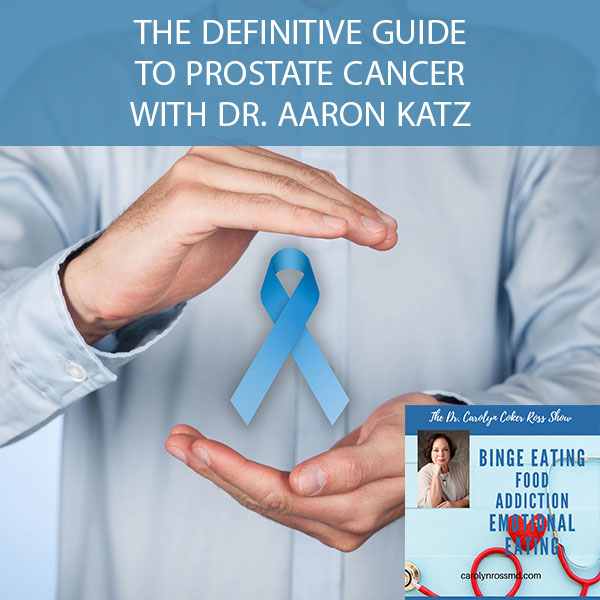
September is prostate cancer awareness month. One in every six men will be diagnosed with prostate cancer in his lifetime. This affects not only the patients themselves but their families as well. That is why it is important to get acquainted with everything about it as best as you can. Dr. Aaron Katz is the director of the Center for Holistic Urology and an associate professor of Clinical Urology at Columbia University. He talks about his book, The Definitive Guide to Prostate Cancer: Everything You Need to Know about Conventional and Integrative Therapies. Learn the process of being tested – from the PSA (Prostate-specific antigen) to ultrasound and biopsy, and find out some holistic therapies such as the use of herbal supplements and acupuncture, and the role of nutrition and lifestyle to prevent or manage prostate cancer.
—
Listen to the podcast here:
The Definitive Guide To Prostate Cancer with Dr. Aaron Katz
It is Prostate Cancer Awareness Month. One in every six men will be diagnosed with prostate cancer in his lifetime, which affects families as well as the patients themselves. In honor of Prostate Cancer Awareness Month, my special guest is Dr. Aaron Katz. Dr. Katz is the Director of the Center for Holistic Urology and an associate professor of clinical urology at Columbia University where he’s been a faculty member since 1993. Dr. Katz is one of the top doctors in the country in integrative treatments. He has been approved as the first doctor in the country to work with an FDA-approved herbal approach in prostate cancer prevention. He appears on Imus in the Morning and addresses prostate cancer issues on his weekly WABC radio show, Katz’s Corner. Welcome to the show, Dr. Katz.
Thank you very much for having me. It’s great to be here with you.

The Definitive Guide to Prostate Cancer: Everything You Need to Know about Conventional and Integrative Therapies
I understand you have a book called The Definitive Guide to Prostate Cancer.
Rodale Press is the publisher. It’s is available on Amazon.com, The Definitive Guide to Prostate Cancer. It contains everything from integrative approaches to the conventional treatments for those men that have been either newly diagnosed with prostate cancer and are looking for an option. It is for those men that have had prostate cancer and have had a relapse, which would be typically defined as a rising PSA. The PSA is the blood test that indicates prostate cancer. The book goes through if you have prostate cancer, what it means, what stage of cancer you might be in, the conventional treatments like surgery, radiation, and cryotherapy. As well as what I feel a very important mode of therapy, which is Active Holistic Surveillance. It is for a majority of men with a low-risk prostate cancer where diet and herbal supplements may be enough for these men where they can be spared from undergoing radiation or surgery.
I’ve been hearing a lot about prostate cancer in the media. Is that because the incidence of prostate cancer is increasing?
It probably is. We are seeing because of the widespread use of the PSA test, more and more patients are diagnosed at a younger age. In my weekly radio show Katz’s Corner on WABC, we had a guest who was diagnosed at the age of 35 with prostate cancer. The only reason that he was diagnosed interestingly was that when he went for his routine tests for his physical, his doctor happened to check off the PSA. Then they called him and said, “Your blood test came back high for your prostate.” He doesn’t have a family history. He’s not African-American. Those are fairly known risk factors for prostate cancer. Here he was, he has no symptoms at all. They repeated the test that certainly was high and then he went for the next step, which would be a biopsy. It did confirm prostate cancer.
Is that a complete accident? We don’t routinely screen men of that age for prostate cancer.
Typically, we start screening in this country at the age of 50 although there is controversy about that. Maybe we should be starting earlier at age 40, especially for those men who are African-American or that have a strong family history. If your brother has cancer of the prostate or your father, you probably should have to test at least once starting at the age of 40. Then maybe 45 and then 50. It’s just a blood test, but it should be also combined with a digital, a finger exam so that the doctor can feel the prostate and get an evaluation of the size of the prostate. A larger prostate, although it’s not cancer, if it increases in size, can make the PSA bounce up too. It doesn’t have to be necessarily from prostate cancer.
[bctt tweet=”Without knowing the signs beforehand, a doctor may just go ahead and do a straight biopsy.” username=”CarolynCRossMD”]The guest who called into your show, did the biopsy show that he did have cancer?
It did show he has cancer. He started a foundation for this called the Blue Cure Foundation. He came to see me. He went to a lot of different doctors and was recommended to have either radiation or surgery. A lot of the doctors when patients get diagnosed at a young age, they feel that the prostate should be removed. He decided to go on to the Active Holistic Surveillance one that we defined and outlined in my book. His biopsy which he told us showed no cancer. He had another biopsy. After he went on diet and supplements, there was no cancer that was seen, which is a great news for him. The biopsy is a sampling. I told him that it’s great that it showed no cancer, but it is possible that he still may have prostate cancer. It may be very small and may have been missed on the biopsy. The biopsies have some sampling error in themselves.
Is PSA an accurate way to diagnose prostate cancer along with the digital exam? I’ve heard some controversy about people who may have an elevated PSA and but not have cancer. They have to undergo more procedures.
It’s not 100% accurate but it’s the best test that we have. There are some other tests that can also be helpful. There is a way of looking at prostate cancer in the urine where we massage the prostate and then send the urine. We can look at the specific gene that’s turned on in prostate cancer. We can detect that in the urine. I often do that. It’s called a PCA3 test. I talk about this as well in the book. Doctors should be doing this more routinely. It is a standard way of evaluating and seeing if the PSA is elevated or is it because there’s cancer? This gene test is just a urine test. There are a number of reference laboratories throughout the country that will do the PCA3. That’s something helpful.
Is that more specific than the PSA?

Prostate Cancer: Some of the conventional therapies for prostate cancer have pretty serious side effects.
It can be more informative than the PSA. I always do that test in my office. I do the PSA first then I do the digital exam. Then I have the patient urinate and we send the urine out for this PCA3 urine test. I find that it can be helpful. The other thing that can be helpful is that the PSA we know exists in two forms in the bloodstream. The good and bad PSA, which are almost like good and bad cholesterol. You have your total cholesterol, your LDL and your HDL. With PSA, we have the same thing. We have total PSA. We have good and bad PSA. It’s called free and bound PSA. We can tell you the ratio of those PSAs. Most of the laboratories nowadays will do that. Give us more information about the PSA. Does the patient need to take that next step which is the biopsy? A biopsy is not the worst thing in the world. It’s an outpatient thing. It’s done in the doctor’s office. It takes fifteen minutes. It’s done with local anesthetic, but it is a procedure. We’d like to reduce the number of unnecessary biopsies in this country. Some of these newer tests of looking at PSA can be helpful.
What is the ratio of the free and bound? What ratio would indicate?
The cutoff value is around 15%. If your free PSA is lower than 15%, that increases your risk of prostate cancer. Lower free PSA, higher rates of prostate cancer. If you go down below 10%, then that patient has about an 80% or 90% chance of having prostate cancer. The other thing that we do is have an ultrasound in the office, which can be helpful. It is not a biopsy necessarily, just an ultrasound of the prostate. We take a small probe that’s inserted into the rectum and you can see the prostate very well. You can calculate and determine the patient’s prostate size. You can determine if the patient’s PSA is appropriate for that patient’s prostate size. If you have a patient that has a very large prostate, the PSA may be elevated and that may be normal PSA for that patient just because he has a large prostate. Why do patients get large prostate? We still don’t know the answer to that. It’s probably something genetics, it may be the environment or it may be diet. There are many patients even in their 40s and 50s whose prostates tend to grow which bumps up their PSA. Without knowing the signs beforehand, a doctor may just go ahead and do a straight biopsy. That concept is called PSA density, where we divide the PSA by the prostate volume. It can be a very helpful tool in determining who should have a biopsy or who should not.
I saw some of the literature that you’ve written that prostate cancer is preventable and probably curable if it’s detected early.
A number of the herbal supplements that we’ve been studying which we included in our Active Holistic Surveillance Program, which we talked about in the book can be helpful in prevention. There has been a number of studies using drugs which try to prevent prostate cancer, that reduces a specific hormone level in the male body. There’s been some controversy about the drugs. It does reduce prostate cancer, but it can also have some sexual side effects for men. You’re lowering a specific hormone level in the body which may reduce the man’s ability to have an erection or to produce semen. We have taken more of an herbal or a natural approach and looking at ways of interfering with inflammation. Like many other cancers, that inflammation is directly linked to the development of cancers and I think that’s true for prostate cancer.
[bctt tweet=”Acupuncture has been very helpful with prostate cancer.” username=”CarolynCRossMD”]We’re looking at a number of different herbal compounds. One that we’ve studied and published on at our center is called Zyflamend. Zyflamend is an herbal compound. It contains eight different herbs in it and each of the herbs has very weak anti-inflammatory properties. We’ve done some studies in our laboratory. We’ve also conducted a clinical trial and an FDA trial with this. In our early studies, both laboratory and in the patients did show that in men with precancerous conditions of the prostate we could eliminate those in many of these men.
As an integrated physician in my experience working with other physicians, it’s not very common to find someone in urology who practices integrative therapy. How did you first get interested in that area?
I went through four years of medical school here in the United States and then I did a urology residency, which was six years. Then I did a two-year oncology fellowship at Columbia University. Through my entire training, the amount of time that was spent on nutrition and herbal compounds was virtually zero. I joined the faculty at Columbia University. Within the first few months, I got a phone call from the late Dr. Atkins who had integrated the Atkins Center complementary medicine, which I knew nothing about in Manhattan. He said, “We’re seeing a lot of prostate cancer patients and we’re treating them, but we need a urologist. Can you come down and help us sort these patients out and evaluate them?” I said, “Sure. I’m not that busy. I just started my practice here at Columbia. I’ll go down.”
Every Tuesday, I would go down for about four years there and it opened up my eyes. There were patients there that were maintaining and managing their urinary symptoms and PSA with herbs and diet. Where if they were seen at Columbia, I would be operating on them or biopsying them. I said, “There’s got to be something to this.” I knew nothing even about saw palmetto, beta-sitosterol or some of the more common herbal things that these patients were on. They told me that their PSA had gone down or that their urinary symptoms were improving. I said, “This is incredible. I need to take a further look at this.” In 1998, I opened up the first holistic urology center in the country, if not in the world, to do basic science laboratory investigations on these herbs, as well as clinical trials in men. I said, “If we found that something in the lab worked, let’s try it in our male patients.”
Some of the conventional therapies for prostate cancer have pretty serious side effects.

Prostate Cancer: If nothing was done for these men, then they were going to develop prostate cancer in about 60% to 80% of the time within six months.
There have been some advances in the way that we’re removing the prostate with robotic surgery. That has improved our ability to look at the nerve bundles and prevent men from getting erectile dysfunction. A significant number of men even in expert hands with the robot still wind up with urinary leakage and with erectile dysfunction. The question still bears whether or not these men need to undergo surgery. With radiation, there’s early toxicity as well as delayed toxicity. Secondary cancers can develop, bladder cancers can develop, rectal cancers can develop, urinary problems can develop. The question bears, does a man with a very small prostate cancer need to go through nine weeks of radiation? My feeling is they absolutely don’t. A lot of it is economics. A lot of it is driven by cancer being a big dollar business.
Doctors don’t get paid to give herbs, they get paid to do surgery.
The robot costs about $1.8 million. A lot of the hospitals felt like they had to buy the robot and then the doctors feel they have to fill the beds. The same thing with radiation. A lot of the neurologists have banded together and bought a radiation center and every man with a small little Gleason 6 non-lethal prostate cancer gets sent over for nine weeks of radiation. It’s unfortunate. There’s nothing being done out there in my mind about prevention and looking at diet in a serious way. More and more urologists are becoming more open-minded and are recommending even weight loss. We found that there are a lot of studies that show that if you put a patient on a low-fat diet and reduce the red meat in their diet, you can modulate their PSA. Their PSAs will come down.
Tell us about some of the holistic therapies that you’ve been using at your center and how they work. Give us more information about the research that’s showing.
One of the therapies that we found to be very helpful is acupuncture. We’ve hired an acupuncturist. Jillian has been with us for years. Acupuncture has been terrific to help men with a very common prostate condition, not necessarily prostate cancer but prostatitis, an inflammation of the prostate, which I believe can be a precancerous condition. A lot of the men that we see with this prostatitis are in their 20s, 30s and 40s, younger guys who have this chronic pelvic pain symptoms. Most urologists will give patients antibiotics. They know they don’t have an infection at least they can’t find an infection. The urine culture shows no infection. A lot of urologists get frustrated and throw their hands up.
[bctt tweet=”Acupuncture causes a reconfiguration of the vessels on your skin and significantly reduces the hot flashes.” username=”CarolynCRossMD”]We have found an eight-week course of acupuncture once a week where patients can come into the center and meet with our acupuncturist. They have acupuncture and acupressure and relax the entire lower pelvic muscular area and relieve those spasms. It’s more of a pelvic muscle spasm condition than an infection there. The other thing where acupuncture has been very helpful with prostate cancer is that a lot of men with prostate cancer get put Hormone Therapy. When you go on Hormone Therapy, you go into a male menopause and you develop hot flashes.
What acupuncture has done is it’s causing a reconfiguration of the vessels on your skin significantly reduces the hot flashes. Acupuncture is something that I feel very strongly about. For many of our patients, it can also help with erections. We found a lot of our patients that have failed Viagra or don’t want to go onto Viagra can be helped with that as well. There was a study that came out showing that acupuncture can also help with young men that have premature ejaculation. There’s a whole area where acupuncture and urology are going to come together. It used to be these two circles, the allopathic, then the Western, then the Eastern. They were two separate distinct circles. These circles are coming together closer and closer. A lot of it is patient-driven. A lot of patients don’t want to undergo conventional treatments if they don’t have to. A lot of it is being science-driven. We’re seeing more and more papers in excellent peer-reviewed journals that we’re publishing and other centers are publishing. You even have major academic centers like Memorial Sloan Kettering, M.D. Anderson, Duke, all having these integrative medical centers in their medical centers to treat and evaluate these patients and do research studies.
At your center, I read that you do mind-body therapies as well.
We are doing some mind-body therapies that can be helpful to relieve some of the stress that patients undergo when diagnosed with cancer with the pelvic pain. Even with women with a condition called interstitial cystitis that can be helpful, the hot flashes. There are the whole diet and supplements. Our active holistic protocol for men that have prostate cancer that says, “Do I need to go and have surgery or radiation? Let me take the Katz’s protocol. Let me go on the Active Holistic Surveillance for a while. If I need treatment later on, fine but I want to do this now.”
I will tell you that an overwhelming number of patients who go on this protocol, who are motivated, lose weight and they feel better. Their PSAs are stable or reduced. Many times, their next biopsies show no cancer. Overall, they have a general sense of well-being. Much of the diet and the supplements that we recommend not only are good for the prostate but are very good for the heart. They’re good for bone health. We improve the cardiovascular system. There are a lot of merits. We’re trying to treat the whole body and a whole patient rather than just going in take out the prostate gland.

Prostate Cancer: If you don’t want to take the pills, you can take tomatoes.
I read that you’re involved in a study using herbs and supplements for chemoprevention. Can you tell us a little bit more about how this works?
One of the compounds that we’ve studied quite heavily is called Zyflamend. Zyflamend is available in the health food stores. It contains eight different herbs. They’re all anti-inflammatory within them. The way that I became involved with this was that listening to my patients who were telling me that their PSAs were going down. I said, “What are you taking?” “I’m not taking any medicine.” I said, “Are you taking any herbs?” A lot of the men were saying, “We’re taking this herbal compound for arthritis for my joint pain.” I said, “I don’t know what’s all this about.” We called up the people in Brattleboro, Vermont who make the Zyflamend, made by a company called New Chapter. We started in the lab and we did show that it was working like an herbal aspirin and then we evaluated men.
These were men who already had a biopsy and it didn’t show cancer, but it showed a precancerous condition in the prostate. If nothing was done for these men, then they were going to develop prostate cancer in about 60% to 80% of the time within the six months. We put them on the Zyflamend for eighteen months and biopsy them every six months. We found a significant reduction in prostate cancer detection. We’ve gone to the FDA and we have FDA approval to do the next phase, which would be a Phase 2 study, which would be a larger phase study over the entire country. The first study was just done at our institution at Columbia University. We’re very excited about this. We’re going to enter a lot of patients into this trial. I think that this is paving a new road for us for chemoprevention.
We were talking about Zyflamend, which is an over-the-counter anti-inflammatory, which has been tested I believe head-to-head with Celebrex, the arthritis drug, the COX-2 inhibitor. You’re finding that it’s being helpful in precancerous lesions of the prostate. What are some of the other herbal remedies that you are finding to be helpful in prostate health?
One of the other studies that we’ve been involved with is the pomegranate juice trial. Pomegranate which was originally studied at the UCLA Center for Urology did show that when they were given laboratory animals the extract of the pomegranate that they could interfere with specific cell cycle of the DNA that was involved for prostate cancer growth and it reduced PSA as well. The trial which ended was looking at men that had prostate cancer and their PSA had come back after radiation or surgery. We were looking at the time that it took for that PSA to double because what we know about PSA doubling time is that if you extend the PSA doubling time from let’s say one year to two years to four years, you extend your life. This was a double-blind randomized placebo-controlled trial, which means that the doctors didn’t know if the patients were getting the placebo or the pomegranate extract and the patients didn’t know either.
[bctt tweet=”Acupuncture helps with young men that have premature ejaculation. ” username=”CarolynCRossMD”]Some of the patients were getting a placebo in the three to one ratio. The results were fairly statistically significant that even at four years when patients were taking the POMx supplement that they extended their PSA doubling time. This is part of our active holistic program that’s outlined in the book. I’m very excited about POM. I think that patients with prostate cancer for prevention or treatment should be on that. The other compound that we’ve been studying whether it’s a hormone or a vitamin is still up for debate, but it’s vitamin D. We completed an evaluation of 20,000 of our patients at the Urology Center at Columbia University. 75% of the patients that we saw in our Urology Department were deficient in vitamin D by the standard laboratory. That number goes up if you look at patients with prostate cancer. That’s going to be published in the Journal of Urology. All men should have a vitamin D evaluation. I recommend 5,000 units a day for our patients. Then get another baseline vitamin D level typically in around three months. You can’t take too much vitamin D, there is a toxicity. You have to be very careful about that.
Vitamin D, you’re using it as a way to boost the immune system. Is there any specific relationship with prostate cancer?
Yes, there is a specific relationship and there’s a whole tremendous host of laboratory and epidemiological data to show that there are vitamin D receptors on the cancer cell. If you boost up the vitamin D level in the patient, you can shut down a specific pathway that’s involved in cell growth. This has been well-studied in laboratory studies. Vitamin D is very important. The other compound to enhance the immune system, we’ve been using a Japanese compound called active hexose correlated compound, AHCC. It’s made by a company called Quality Of Life Labs in Sapporo, Japan. It’s an amalgam of three or four different medicinal Japanese mushrooms.
It’s widely used in Japan for a whole host of diseases. We have found that the natural killer cell levels will go up in the patients that are on AHCC. The 35-year-old gentleman that was diagnosed with prostate cancer, he told me in addition to his PSA levels and his negative biopsy after being diagnosed he’s not had any colds or flu. He would typically be on five antibiotics every year. Over the past year, he’s been on no antibiotics at all for the upper respiratory ailments. It’s definitely doing something to the immune system and it can help fight cancer in a natural way. That’s another dietary supplement that we’re excited about.
Tell me a little bit about nutrition and how that affects their risk for prostate cancer. What is the perfect diet for someone who has been diagnosed with prostate cancer?

Prostate Cancer: One of the things that you want to ask your doctor when you get diagnosed is, “How aggressive is my cancer?”
A lot of the studies are showing, ours included, that a plant-based diet is going to be best for the patient. A lot of men though that are used to eating three or four servings of red meat a week, it’s going to be difficult for them to switch over to have a vegetarian or even a vegan diet. I try to tell men to eliminate red meat in their diet. I tell men to reduce the fats in their diet. Stay away from fried foods. Reduce the sugars in your diet, more sugars can promote cancer growth. Reduce your weight. It has to be a combination of diet and exercise. How many times a week are you doing aerobic exercise? You need to do at least three maybe four times a week. With those things eliminating the red meat, reducing the fried foods reducing the sugars, adding green tea instead of diet soda or Cokes. Go more to green tea. All those things can be very helpful for the prostate and the heart, and other ailments that men develop.
Is lycopene still an important nutrient?
Yes, it is. I recommend lycopene, the stewed tomatoes. If you don’t want to take the pills, you can take tomatoes but they have to be stewed. Tomatoes will liberate the most potent carotenoid there is lycopene, which has been shown in about 75 studies to interfere with prostate growth. You can get it from tomatoes and watermelons as well.
I know you probably have seen Dr. Andrew Weil’s Anti-inflammatory Diet. Have you seen the anti-inflammatory pyramid?
Yes.
[bctt tweet=”All the men that are out there should have a vitamin D evaluation.” username=”CarolynCRossMD”]Is that the guide that you’re talking about?
Yes.
What about fish in prostate cancer is that something that’s helpful?
Fish can be helpful especially if you’re taking in more sardines or more wild salmon. Alaska’s salmon, sardines to improve also your Omega-3 ratio to Omega-6 can be helpful. We do include that in our diet.
You started out working with Dr. Atkins at his clinic. Atkins’ diet program was the opposite of what you’re talking about. Does a diet that is high in meat like the Atkins’ diet have any evidence to suggest that it promotes prostate cancer?
There is evidence that charcoal meat can, for sure. There have been studies like that. Men that over-grill or over-barbecue can liberate some of the hydrocarbons in the food that are carcinogenic. When looking at studies in men that eat more red meat, those men tend to have higher rates of prostate cancer.
Not more of poultry, turkey or other animals?
No, it doesn’t appear to be. It appears to be red meat. I don’t know if it’s the hormones that are given to these animals.
I’m wondering if you had the meat where they don’t give hormones and it’s grass-fed.
That’s possible. The guys that say, “I still need that one serving a week.” I say, “Fine, go organic and do it that way if that’s what you need.” Some men if they’re taking pure vegetables all week, they lose a little energy. They’re going to need vitamin B12 shot to make sure that they’re not going to get lower there because they become depleted.
[bctt tweet=”A lot of men are used to eating three or four servings of red meat a week. ” username=”CarolynCRossMD”]If someone has a family member, for example, who has been diagnosed with prostate cancer. A male who has a father or a brother, is there something that they should be doing early on in their lives to try to reduce their risk of developing prostate cancer?
The one thing they could do is get a baseline PSA. That would be important. They have to try and maintain as healthy of a lifestyle with a plant-based diet as best they can. I would recommend checking your vitamin D level. Taking things like low levels of multivitamin, which can include things that have Saw Palmetto to keep your prostate healthy, low levels of vitamin E, selenium, the lycopene, the pomegranate extract. Things like that can all be very helpful, a very healthy diet and exercise. I would probably recommend one to two tablets a day of Zyflamend and two tablets a day of the AHCC.
Is the AHCC available at the health food store?
Most of the health food stores it’s available but if not there’s a website, QOL. It’s Quality of Life Labs. They’ve imported it into the United States from Sapporo, Japan.
The Saw Palmetto is more important than prevention than in treatment?
We use the Saw Palmetto for men who are starting to have some urinary symptoms. It can be helpful for those men if they’re starting to notice a decrease in their urinary stream, they’re getting up at night a few more times. They’re starting to notice a difference rather than going on to some of the pharmaceutical drugs that an herbal supplement like Saw Palmetto, pumpkin seed, and beta-sitosterol can all be very helpful in maintaining the growth of the prostate and reducing the inflammation in the area.
For people who aren’t in the medical profession, is it a necessary organ in the body?
It’s necessary for fertility. It provides the proper nutrients for the sperm to fertilize. If you have to have your prostate removed and you are considering fertility, then you would have to bank your sperm beforehand.
For those of you who don’t know what to do, if there are men or wives of men in our audience, what are the current screening recommendations that men should be going through?
The current recommendations for any male starting at the age of 50, should have a yearly blood test for the prostate that would be the PSA test combined with a digital rectal examination. If you are a man out there that has a known risk factor for prostate cancer and related to risk factors that we know. You’re African-American or you have a strong family history either your brother or your father has prostate cancer, you should be screened earlier probably starting at the age of 40.
[bctt tweet=”Maintain as healthy of a lifestyle with a plant-based diet as best as you can.” username=”CarolynCRossMD”]Once screened then say someone comes back with elevated PSA, what are the conventional and alternative things that they should be considering?
One of the things that you want to ask your doctor when you get diagnosed is, “How aggressive is my cancer?” He can give you a number and that number which is called the Gleason Scale is a scale from two to ten, although I’ll tell you nobody gets diagnosed under six. It’s basically six to ten. If you’re a six or a seven and your PSA is under ten, you may be considered a low-risk prostate cancer patient. Low-risk prostate cancer patients, in my mind, don’t necessarily need any other tests like a CAT scan or a bone scan and may not need treatment. I say may not because not every patient is the same obviously and it needs to be discussed. Many of those patients can go on this active holistic protocol that we outline in the book.
For patients who are diagnosed with more aggressive prostate cancer Gleason eight, nine or ten. Those are high-risk patients. Those patients, I would suggest that you get a CAT scan and a bone scan. To make sure that it’s not in the lymph nodes and make sure that it’s not in the bone. If it is in the lymph nodes or the bone, then you probably are going to need to be started on Hormone Therapy right away. Which would be an injection to reduce the male hormone which will cut off cancer and put you into remission. You could go into remission pretty quickly sometimes within three months, sometimes six months or remission would be a PSA that’s now zero. I wouldn’t have any other treatment until you get into remission. Then you can talk to your doctor about whether or not you should consider an additional treatment like surgery or radiation. That’s for the high-risk patient. It depends and trying to get a handle if you are diagnosed, are you at a low risk, an intermediate risk or a high-risk patient? That’s very important because that will not only determine if you need additional testing but if you need additional treatment.
What is this Gleason scale based on?
Dr. Gleason was a pathologist who looked under the microscope. The pathologist looks at the cells and will see how closely the cancer cells resemble a normal cell. The closer it resembles a normal cell, the lower the Gleason, the less aggressive. If the cells look very aggressive, meaning that they don’t appear under the microscope anything like a normal prostate cancer cell would, then the pathologist will give you a higher Gleason number. The higher Gleason numbers are more commonly associated with the cells that will get through the prostate capsule and escape the prostate and get into the lymph node or the bone.
Does the high Gleason scale then correlate with more aggressive cancers or just some that are farther along in their development?
It correlates directly with the aggressiveness of cancer.
After someone has gone on hormone therapy and say they have gone into remission, what is their risk for relapse after that treatment?
It depends upon how quickly they go into remission. It depends upon how high the PSA was to begin with. Let’s say under ten is considered to be still relatively on the low-risk side. If you come in with a PSA of 50, 60 or 100, it’s more likely going to be that the disease has already spread beyond the prostate. Just by the PSA alone, if you have a PSA of 100, you should not have surgery at that point. You should probably just have hormones. Those patients do have a high rate of relapse based upon the fact that their PSAs are high. Even if you do have a relapse, there are a lot of different hormone therapies that are out. There’s been FDA approval of three or four new drugs to fight that relapse.
One of them is a chemotherapy drug. One of them is an immune therapy drug that was FDA-approved. It’s where you take out your own blood cells and expose them to a prostate cancer antibody. Then re-infuse it into your body and allow your body’s own immune system to fight cancer. That’s been FDA-approved. It’s called Dendreon. There are a lot of different ways. Even if the PSA does relapse, it doesn’t necessarily mean a death sentence for the patient. Many of the patients for prostate cancer even in those high-risk patients with very high PSAs can be managed as a chronic illness. Even if you go into hormones, have the vaccine or have surgery or radiation, I firmly believe that diet and supplements can play a role in all of those patients.
You’ve given a lot of hope for people who may not be aware of some of the less conventional treatments that they can get better, and perhaps not have to go through some of the conventional therapies. I want to just encourage people to look for Dr. Katz’s book, The Definitive Guide to Prostate Cancer: Everything You Need to Know about Conventional and Integrative Therapies. It’s been great to learn more about prostate cancer. I’ve always specialized in women’s medicine, so this wasn’t my forte when I was in practice. Thank you for being on the show.
Thanks for having me. It’s been great.
In our next episode, we will have Rob Weiss, who’s a well-known sex addiction expert. He’s been on many national TV shows talking about this subject. He will be with us talking about sex addiction in the digital age.
Important Links:
- Dr. Aaron Katz
- Katz’s Corner
- The Definitive Guide to Prostate Cancer: Everything You Need to Know about Conventional and Integrative Therapies
- Amazon.com
- Blue Cure Foundation
- Quality Of Life Labs
- Dr. Andrew Weil’s Anti-inflammatory Diet
About Dr. Aaron Katz
 Dr. Aaron Katz is a urologist in Garden City, New York and is affiliated with NYU Winthrop Hospital. He received his medical degree from New York Medical College and has been in practice for more than 20 years.
Dr. Aaron Katz is a urologist in Garden City, New York and is affiliated with NYU Winthrop Hospital. He received his medical degree from New York Medical College and has been in practice for more than 20 years.








